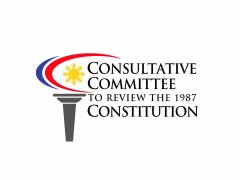
MANILA — The Consultative Committee (Concom) tasked by President Rodrigo R. Duterte to review the 1987 Constitution is proposing provisions that will allow the creation of three high courts under its draft federal Constitution to have a “more efficient” judiciary.
Concom Senior Technical Assistant and spokesman Ding Generoso said that this was the consensus reached by the Concom Subcommitee on the Structure of the Federal Government last week which is still subject for final vote in the Concom’s en banc session.
Generoso pointed out that the current trend in some parts of the world is not limiting the judiciary to one generalized high court like in the current Constitution, but rather having specialized courts to address specific concerns or cases.
“Instead na lahat nakatambak sa Supreme Court, nahahati yung certain cases depende kung anong klaseng issue (So instead of them being piled up at the Supreme Court, the cases can be divided depending on what their issues are),” Generoso said in a press briefing at the Philippine International Convention Center (PICC) on Monday.
Generoso further said that having three high courts would also help unclog the docket or the case backlog of the Supreme Court.
Recent data from the Supreme Court showed that as of January 2017, there are around 8,324 pending cases.
According to Generoso, the three high courts, which will have distinct and separate jurisdiction, will be called: (1) Federal Supreme Court, (2) Federal Constitutional Court, and (3) Federal Administrative Court.
All high three courts will be composed of nine justices, including a Chief Justice for the Supreme Court and a Presiding Justice for the constitutional and administrative courts.
Their appointments will be divided among the three branches of government.
Three of the justices for each high court, including the Chief Justice and the Presiding Justices, will be appointed by the President and three by the Commission on Appointments in the Congress.
The remaining three for the Federal Supreme Court will be appointed by the Federal Constitutional Court, by the Administrative Court (to be chosen from members of the Supreme Court) in the case of the Constitutional Court, and by the Supreme Court for the Administrative Court.
Concom chairman and former Chief Justice Reynato Puno said that giving the Congress power to appoint three of the justices is a response to criticism that justices are not elected by the people.
“Our thinking is that you cannot also completely take away the participation of Congress in the appointment of our justices, Puno said, noting that under the 1987 Constitution SC justices are not subject to confirmation by the Commission on Appointments unlike in the 1935 Constitution.
“This is to somehow reply to the criticism that justices are not elected by the people–that they are counter majoritarian and therefore somehow their selection should also be participated in by members of Congress,” Puno sad.
Below is a breakdown of the jurisdictions of the three high courts:
*Federal Supreme Court will exercise its original jurisdiction over cases involving conflicts between branches and agencies within the Federal Government, conflicts between the Federal Government and the Federated Regions, and conflicts between Federated Regions. It will also have jurisdiction over cases involving ambassadors, other public ministers and consuls; petitions for certiorari, prohibition, and quo warranto.
Moreover, it will have jurisdiction to review on appeal or certiorari final judgments and orders of lower courts except those within the exclusive jurisdiction of the Federal Constitutional Court and Federal Administrative Court; issues of jurisdiction of any lower court, and criminal offenses in which the penalty is life imprisonment or death.
*Federal Constitutional Court will have jurisdiction on disputes involving the constitutionality of a law, treaty, international or executive agreement; Presidential decrees, proclamations, orders, instructions, ordinances, and other regulations, administrative issuances of the Federal Government, or any of its departments and agencies; and laws passed by the legislative assemblies of the Federated Regions, acts and issuances of their Executive.
It will also have jurisdiction over any matter involving pure questions of constitutionality; to try cases of impeachment against all impeachable officials. However, the Congress will have jurisdiction to initiate and prosecute. When asked by Congress, the Federal Constitutional Court may provide advisory opinion on the constitutionality of crucial legislation; and when sought by other courts of general jurisdiction, rule on any constitutional issue that may arise during trial and affect outcome.
*Federal Administrative Court will have exclusive jurisdiction to review on appeal or certiorari the decisions, judgements, final orders or resolutions of quasi-judicial bodies.